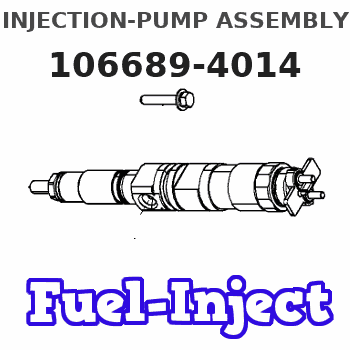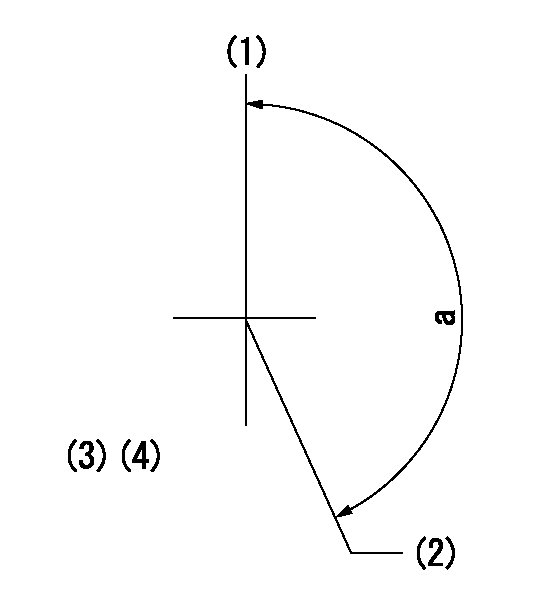Information injection-pump assembly
BOSCH
9 400 611 285
9400611285
ZEXEL
106689-4014
1066894014

Rating:
Service parts 106689-4014 INJECTION-PUMP ASSEMBLY:
1.
_
3.
GOVERNOR
7.
COUPLING PLATE
8.
_
9.
_
11.
Nozzle and Holder
6215-11-3202
12.
Open Pre:MPa(Kqf/cm2)
27.5{280}
15.
NOZZLE SET
Include in #1:
106689-4014
as INJECTION-PUMP ASSEMBLY
Cross reference number
BOSCH
9 400 611 285
9400611285
ZEXEL
106689-4014
1066894014
Zexel num
Bosch num
Firm num
Name
Calibration Data:
Adjustment conditions
Test oil
1404 Test oil ISO4113 or {SAEJ967d}
1404 Test oil ISO4113 or {SAEJ967d}
Test oil temperature
degC
40
40
45
Nozzle and nozzle holder
105780-8130
Bosch type code
EFEP215A
Nozzle
105780-0050
Bosch type code
DN6TD119NP1T
Nozzle holder
105780-2090
Bosch type code
EFEP215
Opening pressure
MPa
17.2
Opening pressure
kgf/cm2
175
Injection pipe
Outer diameter - inner diameter - length (mm) mm 8-4-1000
Outer diameter - inner diameter - length (mm) mm 8-4-1000
Overflow valve
131425-1620
Overflow valve opening pressure
kPa
255
221
289
Overflow valve opening pressure
kgf/cm2
2.6
2.25
2.95
Tester oil delivery pressure
kPa
157
157
157
Tester oil delivery pressure
kgf/cm2
1.6
1.6
1.6
Direction of rotation (viewed from drive side)
Right R
Right R
Injection timing adjustment
Direction of rotation (viewed from drive side)
Right R
Right R
Injection order
1-5-3-6-
2-4
Pre-stroke
mm
3.5
3.45
3.55
Beginning of injection position
Drive side NO.1
Drive side NO.1
Difference between angles 1
Cal 1-5 deg. 60 59.5 60.5
Cal 1-5 deg. 60 59.5 60.5
Difference between angles 2
Cal 1-3 deg. 120 119.5 120.5
Cal 1-3 deg. 120 119.5 120.5
Difference between angles 3
Cal 1-6 deg. 180 179.5 180.5
Cal 1-6 deg. 180 179.5 180.5
Difference between angles 4
Cyl.1-2 deg. 240 239.5 240.5
Cyl.1-2 deg. 240 239.5 240.5
Difference between angles 5
Cal 1-4 deg. 300 299.5 300.5
Cal 1-4 deg. 300 299.5 300.5
Injection quantity adjustment
Adjusting point
A
Rack position
15.8
Pump speed
r/min
1050
1050
1050
Average injection quantity
mm3/st.
391
388
394
Max. variation between cylinders
%
0
-3
3
Basic
*
Fixing the rack
*
Remarks
Standard point A's rack position same as 106681-4026 in row L.
Standard point A's rack position same as 106681-4026 in row L.
Injection quantity adjustment_02
Adjusting point
-
Rack position
9.3+-0.5
Pump speed
r/min
340
340
340
Average injection quantity
mm3/st.
20
18.5
21.5
Max. variation between cylinders
%
0
-15
15
Fixing the rack
*
Injection quantity adjustment_03
Remarks
Rack limit setting R = 17.1+0.2
Rack limit setting R = 17.1+0.2
Timer adjustment
Pump speed
r/min
(N1+50)-
-
Advance angle
deg.
0
0
0
Remarks
Start
Start
Timer adjustment_02
Pump speed
r/min
N1
Advance angle
deg.
0.5
Remarks
Measure the actual speed.
Measure the actual speed.
Timer adjustment_03
Pump speed
r/min
-
Advance angle
deg.
2.5
2
3
Remarks
Measure the actual speed, stop
Measure the actual speed, stop
Test data Ex:
Timing setting

(1)Pump vertical direction
(2)Coupling's key groove position at No 1 cylinder's beginning of injection
(3)-
(4)-
----------
----------
a=(150deg)
----------
----------
a=(150deg)
Information:
Cruise Control On/Off Input Circuit
The cruise control (CC) and power take-off (PTO) ON/OFF input is an ordinary switch. With this switch in the ON position, it is possible to "activate" the cruise control or power take-off mode if other ECM programmed conditions are met.With this switch "open" (or OFF), the input line to the ECM will go to approximately 5 volts. With the switch "closed" (or ON), the input line to the ECM will go to 0 volts (ground).Cruise Control Set/Resume Input Circuit
The cruise control and power take-off set/resume is provided by a three position switch. The switch is used to SET vehicle speed or engine rpm. The function of each position of the switch is as follows:1) CENTER POSITION, the set/resume switch is "open" and all inputs are inactive.2) SET POSITION, after the switch is moved to the SET position and released, the ECM will maintain the existing engine rpm (determining vehicle speed) when the switch was released. If the engine is held in the SET position, the ECM will gradually increase engine rpm (determining vehicle speed) until the switch is released.3) RESUME POSITION, if cruise is deactivated by application of the clutch or service brake, and the switch is then moved to the RESUME position and released, the cruise (PTO) mode is reactivated to the last setting. If the switch is held in the RESUME position, the ECM will gradually decrease engine rpm (determining vehicle speed) until the switch is released.With this switch "open" (or OFF), the input line to the ECM will go to approximately 5 volts. With the switch "closed" (or ON), the input line to the ECM will go to 0 volts (ground).Vehicle Switches Input Circuits
The brake switch is used to deactivate the cruise or PTO modes when the vehicle service brakes are applied. The brake switch is also used to activate the retarder enable output if the service brakes are applied while in cruise mode.The clutch switch is used to deactivate the cruise or PTO modes when the clutch pedal is pressed. The clutch switch is used to DEACTIVATE the retarder enable circuit.With this switch "open" (or OFF), the input line to the ECM will go to approximately 5 volts. With the switch "closed" (or ON), the input line to the ECM will go to 0 volts (ground).Fuel Pressure Input Circuit
Fuel pressure is monitored after the filter by the fuel pressure sensor which is located on the fuel filter housing. The 5 Volt DC operating voltage for this sensor is supplied by the ECM. The output of the fuel pressure sensor is a .5 to 4.5 Volts DC signal. The voltage is dependent upon fuel pressure and is interpreted by the ECM as fuel pressure. If fuel pressure is less than 445 kPa (65 psi) at rated rpm, the "check engine" light is turned on.Engine Electrical System
The electrical system can have three separate circuits: the charging circuit, the starting circuit and the low amperage circuit. Some of the electrical system components are
The cruise control (CC) and power take-off (PTO) ON/OFF input is an ordinary switch. With this switch in the ON position, it is possible to "activate" the cruise control or power take-off mode if other ECM programmed conditions are met.With this switch "open" (or OFF), the input line to the ECM will go to approximately 5 volts. With the switch "closed" (or ON), the input line to the ECM will go to 0 volts (ground).Cruise Control Set/Resume Input Circuit
The cruise control and power take-off set/resume is provided by a three position switch. The switch is used to SET vehicle speed or engine rpm. The function of each position of the switch is as follows:1) CENTER POSITION, the set/resume switch is "open" and all inputs are inactive.2) SET POSITION, after the switch is moved to the SET position and released, the ECM will maintain the existing engine rpm (determining vehicle speed) when the switch was released. If the engine is held in the SET position, the ECM will gradually increase engine rpm (determining vehicle speed) until the switch is released.3) RESUME POSITION, if cruise is deactivated by application of the clutch or service brake, and the switch is then moved to the RESUME position and released, the cruise (PTO) mode is reactivated to the last setting. If the switch is held in the RESUME position, the ECM will gradually decrease engine rpm (determining vehicle speed) until the switch is released.With this switch "open" (or OFF), the input line to the ECM will go to approximately 5 volts. With the switch "closed" (or ON), the input line to the ECM will go to 0 volts (ground).Vehicle Switches Input Circuits
The brake switch is used to deactivate the cruise or PTO modes when the vehicle service brakes are applied. The brake switch is also used to activate the retarder enable output if the service brakes are applied while in cruise mode.The clutch switch is used to deactivate the cruise or PTO modes when the clutch pedal is pressed. The clutch switch is used to DEACTIVATE the retarder enable circuit.With this switch "open" (or OFF), the input line to the ECM will go to approximately 5 volts. With the switch "closed" (or ON), the input line to the ECM will go to 0 volts (ground).Fuel Pressure Input Circuit
Fuel pressure is monitored after the filter by the fuel pressure sensor which is located on the fuel filter housing. The 5 Volt DC operating voltage for this sensor is supplied by the ECM. The output of the fuel pressure sensor is a .5 to 4.5 Volts DC signal. The voltage is dependent upon fuel pressure and is interpreted by the ECM as fuel pressure. If fuel pressure is less than 445 kPa (65 psi) at rated rpm, the "check engine" light is turned on.Engine Electrical System
The electrical system can have three separate circuits: the charging circuit, the starting circuit and the low amperage circuit. Some of the electrical system components are